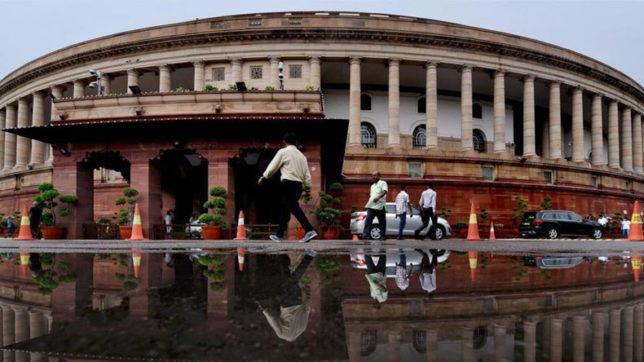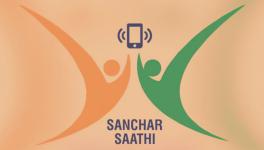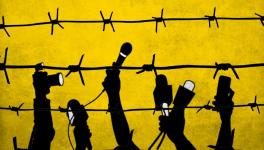No-Trust Motion and Controversial Bills: An Overview of What to Look Forward to in the Monsoon Session

Expressing its distrust with the present NDA government, the united opposition, on the first day of Monsoon Parliamentary Session moved a no-confidence motion and raised the issue of increasing number of farmers’ suicides and of rapes on women in the country.
Lok Sabha speaker Sumitra Mahajan accepted the no-confidence motion appeal and scheduled the discussion for Friday in the lower house of the Parliament.
There have been numerous attacks on activists, students, Dalits, religious minorities. There has been an overall crackdown of educational institutes and a series of onslaughts on higher education. Hapur cow-lynching victim Qasim, eight-year-old rape victim, assault victim Swami Agnivesh are just a few examples of the victims of the communal agenda perpetrated by the government.
PM Modi has seemed to completely ignore the plight that his people are in and has chosen to stay silent on the cases where his own party members and supporters afflicted violence. These cases have increased grossly in the past year, and violence in the name of Hindutva has become a normalised affair.
Also Read: Parliament: What About Farmers & Workers? And, Jobs?
Senior Congress leader Shashi Tharoor, during his speech yesterday, urged PM Modi to “break his silence on the behaviour of his party men and take action against anti-national elements indulging in lynching and mob frenzy”. Attempting to justify and clarify the rising cases of mob lynching in the country, BJP spokesperson Meenakshi Lekhi blamed the growing endemic on “economic disparity”, diverting focus from any question regarding the failure of the ruling party to have maintained law and order in the country, or to have checked the rising intolerance among the fringe groups – a reason stated by the Supreme Court for the emergence of this ‘mobocracy’.
Day one of Monsoon Parliamentary Session
The Monsoon Session, an 18-day session that concludes on August 10, commenced yesterday, amidst a storm that had taken over the political climate of the nation. This session was ushered in by multifarious controversies that revolve around the growing atrocities and inequality in the country, and the government’s inaction. At the meeting of all the major opposition parties, including the Congress, a decision of putting up a united force in the Monsoon Session was made, to let both Houses function in the proper manner. “If there is no discussion on all the issues, and disturbances created, then the opposition will not be responsible for it, the government will,” said Leader of Opposition Ghulam Nabi Azad.
Bills that were most debated on day one include The Right of Children to Free and Compulsory Education (Second Amendment) Bill,which invited major backlash from the opposition, that argued that the quality of education in government schools all over India is extremely poor and thus, failing children will not solve any problem.
In the second half of the day, Union Home Minister Rajnath Singh assured that there would be no dilution of the Scheduled Caste and Scheduled Tribes (Prevention of Atrocities) Act, and that the government has already taken steps for protecting rights of SC/STs by amending the relevant law.
Another major bill that was pushed in the session was the Women’s Reservation Bill,which gained support from the opposition. Ahead of the Monsoon Session Rahul Gandhi had made strong requests to the ruling party to approve the bill in the session. Today, working president of UPA constituent DMK, MK Stalin proposed “whole hearted support” to Gandhi and pushed for the bill himself.
Controversial bills on the table
There are 25 bills that have been tabled for discussion under the column of ‘Bills for consideration and passage’ and, 18 under ‘Bills for introduction, consideration and passage’. Some of the bills in the list seem to instantly raise questions and concerns. The Surrogacy (Regulation) Bill that was introduced in 2016 has been re-introduced for this session. It loosely postulates some guidelines for parents who wish to opt for surrogacy, such as, the mother providing the surrogate child must be a close relative of the parents seeking the child, but the term “close relative” has not been defined. Further, the surrogate mother may donate her own egg for the pregnancy. This may lead to negative health consequences for the surrogate baby – complications that the Centre doesn’t seem to have considered. The bill prohibits commercial surrogacy allowing only altruistic surrogacy, but there are no clear measures stated as to how the State plans on successfully distinguishing between the two.
The Prevention of Corruption (Amendment) Bill that had been introduced in 2013, makes it tougher for a person to prove that a bribe has been taken. The amendment has redefined the term “criminal misconduct” and now requires that the intention to acquire assets disproportionate to income also be proved, in addition to possession of such assets. This amendment, if passed, will raise the threshold to establish any such offence.
The Right to Information (Amendment) Bill has also been introduced in this session. What’s most unsettling is that, out of the 18 new bills on the list, this is the only one with no explanation and introduction. A suspicious “Amendment to RTI Act, 2005” is all that the column for explanation reads.
The Transgender Persons (Protection of Rights)Bill lays down a basic definition of the term ‘transgender’. The Bill prohibits discrimination against a transgender person in areas such as education, employment, and healthcare. However, the punishment for sexual abuse of a transgender individual seems like a mere compensation when compared to the rape laws in the country. Further, the terms such as ‘trans man’, ‘trans woman’, ‘intersex variations’ have been haphazardly used, but have not been defined. The definition of a ‘transgender individual’ doesn’t meet the internationally recognised interpretation.
There are various other bills that have been tabled for debate, and have been surrounded with controversy since they were announced. The Criminal Law Amendment Bill is being introduced for the first time in the Parliament. Ahead of the Monsoon Session, there was great debate over the particulars of this Bill. It seeks to increase the punishment for the offence of rape of women and introduces death penalty for the rape of girls below age 12. There are several human rights organisations and women’s organisations who have openly resisted the passage of this Bill. The death penalty has proved to be no deterrent to crimes committed in the country, and it’s widely believed to have failed in curbing crimes against women too. The National Crime Records Bureau (NCRB) recently released its report for the year 2018, till June, which clearly points to an increase in the number of crimes committed against women. “The judges have been awarded discretion in deciding whether the accused should be punished with death. This allows huge scope for personal biases and will end in the targeting of religious and caste minorities,” said Bindu Doddahatti, litigator, Alternative Law Forum.
The current political impasse is a result of the last session of Parliament that ended in complete disruption and the Budget Session that was reported to be the shortest discussion on a union budget in past 18 years. Right of Children to Free and Compulsory Education (Second Amendment) has already been passed and several others are under scrutiny. The resolve of the opposition to stand united to ensure proper functioning of the houses hasn’t seemed to shake till now, but the disruptions in the upper house on the first day itself don’t paint a good picture.
Get the latest reports & analysis with people's perspective on Protests, movements & deep analytical videos, discussions of the current affairs in your Telegram app. Subscribe to NewsClick's Telegram channel & get Real-Time updates on stories, as they get published on our website.
























